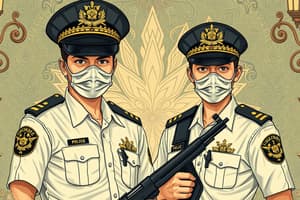Podcast
Questions and Answers
Which of the following is NOT a component of the Criminal Justice System?
Which of the following is NOT a component of the Criminal Justice System?
- Public Relations (correct)
- Corrections
- Law Enforcement
- Prosecution
The mobilized community does not play a role in crime prevention.
The mobilized community does not play a role in crime prevention.
False (B)
Which of the following is a good value system for the Philippine National Police (PNP)?
Which of the following is a good value system for the Philippine National Police (PNP)?
- Dishonesty
- Bribery
- Greed
- Desire to help and serve others (correct)
Ethics in the police force means following standards of conduct.
Ethics in the police force means following standards of conduct.
A ______ refers to the information, whether in its original form or otherwise.
A ______ refers to the information, whether in its original form or otherwise.
What is the primary function of courts in the Criminal Justice System?
What is the primary function of courts in the Criminal Justice System?
Match the following police ethical challenges with their descriptions:
Match the following police ethical challenges with their descriptions:
Records and documents can be used interchangeably.
Records and documents can be used interchangeably.
Flashcards are hidden until you start studying
Study Notes
Criminal Justice System Overview
- The Criminal Justice System (CJS) is essential for preventing and controlling crime in society.
- It consists of law enforcers, prosecutors, defense lawyers, judges, corrections personnel, and community involvement.
Components of the Criminal Justice System
- Law Enforcement: Responsible for crime prevention, protection of rights, and maintaining peace and order.
- Prosecution: Files cases against alleged offenders, ensuring investigation and establishing probable cause.
- Courts: Provide a forum for the prosecution to present evidence of guilt against the accused.
- Corrections: Manages prison systems emphasizing corrective, rehabilitative, and restorative measures.
- Mobilized Community: Encourages societal norms and limits individual behavior for communal benefit.
Roles of the Criminal Justice System
- Prevent crime and protect citizens' rights and property.
- Enforce laws and remove dangerous individuals from the community.
- Investigate, apprehend, prosecute, and sentence offenders.
- Rehabilitate offenders to reintegrate them into society as law-abiding citizens.
Barangay Justice System
- Operates under Katarungang Pambarangay, established by PD 1508 and amended by RA 7610.
- Involves lupon tagapamayapa for amicable settlement of disputes, serving as an informal court.
- Aims to expedite the resolution of court cases through conciliation, mediation, and arbitration.
Police Ethics in Investigation
- Values crucial for the Philippine National Police (PNP) include honesty, respect for human rights, professionalism, justice, service, patriotism, and selflessness.
- Ethics are the standards of conduct required for effective functioning within a profession.
Challenges to Police Ethical Behavior
- Individual character flaws leading to dishonesty, greed, and corruption.
- Deviant Behaviors: Brutality, abuse of authority, lying, sexual misconduct, extortion, theft, bribery, and substance abuse.
PNP Police Professional Conduct Principles
- Commitment to democracy, public interest, and non-partisanship.
- Emphasis on physical fitness, secrecy discipline, and social awareness.
- Proper care for public property and respect for human rights.
- Responsibilities include loyalty, obedience to superiors, command responsibility, and conservation of resources.
Essential Principles of Power and Authority
- Legality: Actions must be lawful.
- Necessity: Power should be exercised only when required.
- Proportionality: Use of force must be proportionate to the situation.
Records Management
- Record: Information stored in various forms including documents, images, and data.
- File: A collection of related records, organized systematically.
- Document: Recorded information often used interchangeably with 'record.'
- Archives: Items selected for permanent preservation due to their enduring value.
- Current Records: Records that remain in active use.
Studying That Suits You
Use AI to generate personalized quizzes and flashcards to suit your learning preferences.




